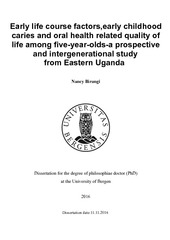Early life course factors, early childhood caries and oral health related quality of life among five-year-olds – a prospective and intergenerational study from eastern Uganda
Abstract
Background: The Early childhood caries, ECC, literature considering children in low income countries is limited to a few cross-sectional studies. Longitudinal studies using causal diagrams (DAGs) with intergenerational empirical data are missing in the dental literature. Aim: To estimate the effects of an exclusive breastfeeding, EBF, intervention in pregnant mothers on ECC in her offspring, the prevalence of ECC and the effect of early life course factors on ECC and OHRQOL of 5- year-old children and their caretakers in Mbale, Eastern Uganda. Methods: This study is based on data from a birth cohort of mother-child pairs emanating from the PROMISE-EBF trial (ClinicalTrials.gov no: NCT00397150). In 2011, at a 5-year follow-up of the birth cohort, 417 mother-child pairs participated in face to face interviews and underwent full mouth dental examinations at a household level. ECC and mother’s caries experience was recorded according to the World Health Organization’s criteria. Information about early life course factors, such as feeding habits, breastfeeding, parental characteristics and socio-economic status, SES, was assessed at the recruitment-, 3-, 6-, 12-, 24- weeks, 2- years and 5-years follow-up interviews with mothers or caretakers. Results: The prevalence of ECC in 5- year-old children was 39%, whereas mean dmft was 1.5 (standard deviation [SD] 2.9) and 1.7 (SD 2.9) in the intervention and control groups, respectively (Study 1). Utilising DAGs, EBF was a protective causal factor of ECC from analyses involving three multivariable models (Study II). Study III revealed that caretaker’s caries experience was positively associated with the ECC of their children and ECC was positively associated with poor OHRQOL in children and their families. Conclusion: Using a birth cohort design, this thesis provides evidence of early life course factors as possible causal factors of ECC. Consistent with a life course model, the hypothesis of intergenerational association in caries experience and OHRQOL between mothers and their 5- year-old offspring was supported. Consequences: Further work using intervention studies involving early life-course risk factors of ECC is needed to inform oral health promotion policy in Uganda.
Has parts
Paper I: Birungi N, Fadnes LT, Okullo I, Kasangaki A, Nankabirwa V, Ndeezi G, Tumwine JK, Tylleskär T, Lie SA, Åstrøm AN. Effect of Breastfeeding Promotion on Early Childhood Caries and Breastfeeding Duration among 5 Year Old Children in Eastern Uganda: A Cluster Randomized Trial. PLoS ONE 2015; 10(5): e0125352. The article is available at: http://hdl.handle.net/1956/13067Paper II: Birungi N, Fadnes LT, Kasangaki A, Nankabirwa V, Okullo A, Lie SA, Tumwine JK, Åstrøm AN, for the PROMISE-EBF study group. Assessing causal effects of early life course factors on early childhood caries in 5-yearold Ugandan children using directed acyclic graphs (DAGs): A prospective cohort study. Full text not available in BORA.
Paper III: Nancy Birungi, Lars Thore Fadnes, Victoria Nankabirwa James Kashugyera Tumwine, Anne Nordrehaug Åstrøm, for the PROMISE-EBF study group. Associations of caretaker characteristics with early childhood caries and oral health related quality of life: a prospective two generation study. Full text not available in BORA.
